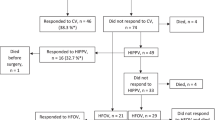Abstract
Purpose
This study was aimed to evaluate the influence of timing of surgery on patient outcomes, and to clarify appropriate timing of surgery in neonates with congenital diaphragmatic hernia (CDH).
Methods
A total of 477 neonates with isolated CDH were included. Patients were classified into two groups by timing of surgery: early repair (ER) (≤48 h) and delayed repair (DR) (>48 h). The primary outcome was 90-day survival, with treatment duration (ventilation, oxygen, and hospitalization) being a secondary outcome. To adjust for disease severity, patients were stratified into three severities by Apgar score 1 min (“mild” 8–10, “moderate” 4–7, and “severe” 0–3), and outcomes were compared between ER and DR within each severity.
Results
Although 90-day survival was significantly different among the three severities (“mild” 97%, “moderate” 89%, and “severe” 76%, p = 0.002), there were no differences in 90-day survival between DR and ER within each severity. In “mild”, there were no differences in treatment duration between ER and DR. In “moderate”, treatment duration was shorter in ER than DR (ventilation 11 vs. 16 days, oxygen 15 vs. 20 days, and hospitalization 34 vs. 48 days). In “severe”, treatment duration was shorter in ER than DR, while the best OI was higher in DR than ER.
Conclusions
Timing of CDH repair seems to have no influence on 90-day survival regardless of disease severity. Patients with moderate severity may benefit from the early repair by reducing treatment duration.

Similar content being viewed by others
References
West KW, Bengston K, Rescorla FJ et al (1992) Delayed surgical repair and ECMO improves survival in congenital diaphragmatic hernia. Ann Surg 216:454–462
Frenckner B, Ehren H, Granholm T et al (1997) Improved results in patients who have congenital diaphragmatic hernia using preoperative stabilization, extracorporeal membrane oxygenation, and delayed surgery. J Pediatr Surg 32:1185–1189
Clark RH, Hardin WD, Hirschl RB et al (1998) Current surgical management of congenital diaphragmatic hernia- a report of the congenital diaphragmatic hernia study group. J Pediatr Surg 33:1004–1009
Harting MT, Lally KP (2007) Surgical management of neonates with congenital diaphragmatic hernia. Semin Pediatr Surg 16:109–114
Reyes C, Chang LK, Waffarn F et al (1998) Delayed repair of congenital diaphragmatic hernia with early high-frequency oscillatory ventilation during preoperative stabilization. J Pediatr Surg 1998:1010–1016
Reickert CA, Hirschl RB, Schumacher R et al (1996) Effect of very delayed repair of congenital diaphragmatic hernia on survival and extracorporeal life support use. Surgry 120:766–773
Usui N, Kitano Y, Okuyama H et al (2011) Reliability of the lung to thorax transverse area ratio as a predictive parameter in fetuses with congenital diaphragmatic hernia. Pediatr Surg Int 27:39–45
Kesieme EB, Kesiem CN (2011) Congenital diaphragmatic hernia: review of current concept in surgical management. ISRN Surg (Article ID 974041)
Moyer V, Moya F, Tibboel R, et al (2010) Late versus early surgical correction for congenital diaphragmatic hernia in newborn infants. Cochrane Database of Systemic Review no 3 (Article ID CD001695)
Langer JC, Filler RM, Bohn DJ (1998) Timing of surgery for congenital diaphragmatic hernia: is emergency operation necessary? J Pediatr Surg 23:731–734
Rozmiarek AJ, Qureshi FG, Cassidy HR et al (2004) Factors influencing survival in newborns with congenital diaphragmatic hernia: the relative role of timing of surgery. J Pediatr Surg 39:821–824
Murthy K, Pallotto EK, Gien J et al (2016) Predicting death or extended length of stay in infants with congenital diaphragmatic hernia. J Perinatol 36:654–659
Gentili A, Pasini L, Iannella E et al (2015) Predictive outcome indexes in neonatal Congenital Diaphragmatic Hernia. J Matern Fetal Neonatal Med 28:1602–1607
Brindle ME, Cook EF, Tibboel D et al (2014) A clinical prediction rule for the severity of congenital diaphragmatic hernias in newborns. Pediatrics 134:e413–e419
de la Hunt MN, Madden N, Scott JES et al (1996) Is delayed surgery really better for congenital diaphragmatic hernia?: A prospective, randomized clinical trial. J Pediatr Surg 31:1554–1556
Nio M, Haase G, Kennaugh J et al (1994) A prospective randomized trial of delayed versus immediate repair of congenital diaphragmatic hernia. J Pediatr Surg 29:618–621
Hollinger LE, Lally PA, Tsao K, Congenital Diaphragmatic Hernia Study Group et al (2014) A risk-stratified analysis of delayed congenital diaphragmatic hernia repair: does timing of operation matter? Surgery 156:475–482
Puligandla PS, Grabowski J, Austin M et al (2015) Management of congenital diaphragmatic hernia: A systematic review from the APSA outcomes and evidence based practice committee. J Pediatr Surg 50:1958–1970
Kamata S, Usui N, Ishikawa S et al (1998) Prolonged preoperative stabilization using high-frequency oscillatrory ventilation does not improve the outcome in neonates with congenital diaphragmatic hernia. Pediatr Surg Int 13:542–546
Okuyama H, Kubota A, Oue T et al (2002) Inhaled nitric oxide with early surgery improves the outcome of antenatally diagnosed congenital diaphragmatic hernia. J Pediat Surg 37:1188–1190
Wilson JM, Lund DP, Lillehei CW et al (1992) Delayed repair and preoperative ECMO does not improve survival in high-risk congenital diaphragmatic hernia. J Pediatr Surg 27:368–372
Acknowledgements
This work was supported by a Grant from The Ministry of Health, Labour and Welfare of Japan (H23-Nanchi-Ippan-051, Health and Labour Sciences Research Grants for Research on intractable diseases. The authors thank all the members of Japanese CDH study group and all the participant institutes in this study.
Author information
Authors and Affiliations
Consortia
Corresponding author
Ethics declarations
Conflict of interest
The authors declare that they have no conflict of interest.
Rights and permissions
About this article
Cite this article
Okuyama, H., Usui, N., Hayakawa, M. et al. Appropriate timing of surgery for neonates with congenital diaphragmatic hernia: early or delayed repair?. Pediatr Surg Int 33, 133–138 (2017). https://doi.org/10.1007/s00383-016-4003-1
Accepted:
Published:
Issue Date:
DOI: https://doi.org/10.1007/s00383-016-4003-1




